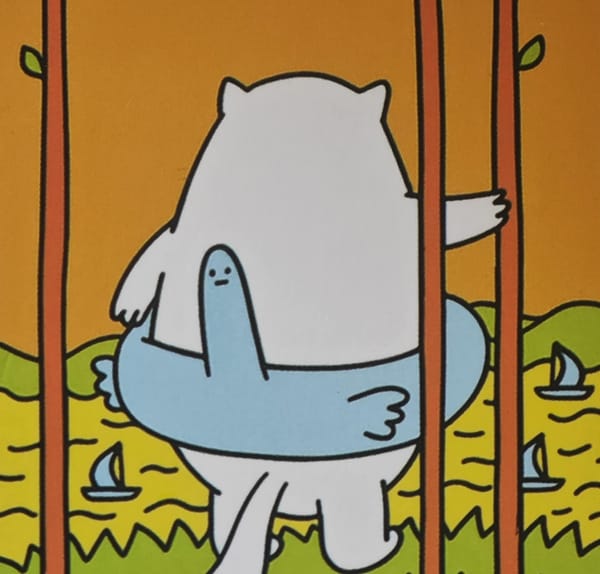Spirituality in a Post-Religious World
Building Morality Without a Master

Growing up I heard about the 10 commandments pretty quickly. I was raised in a culture that identifies heavily with Christianity but is secular in its nature. Within the actual words was conveyed the message that above all things, these are the most moral, with caveats of course because ‘times have changed’ (a concept I would later understand was very much a ‘pick and choose diet’ based on people’s individual or community mindset).
Some made sense right away, not to kill, or steal had been known to me as far as I could remember - messages easily taught to children under the framework of treating people as you would want to be treated - not to covet seemed like a good way to live, very virtuous. The sabbath, lords name in vain, no other gods were very much ‘for the religious people’. Even as a kid I could understand there were so many different levels of believers. And not only did they view God, the bible or the church differently, they viewed each other differently. The secular christians seemed to look at the religious ones as a bit crazy, almost to say, “ok we all believe in God but come on, creation in 6 days so we have to rest every sabbath? Let’s not go too far”.
And what are these people really saying? That they don’t believe in God? That they don’t believe in the texts? That the stories aren’t literal but the meanings behind them are?
I think that these people who don’t believe in the fables and stories but are still followers are people who don’t know what to do without the structure that the institution of religion gives them.
Religion is tradition, it’s ritual, it’s community, it is something that brings us together. It notices our suffering and gives it meaning. It tells us we are whole or loved. Or that we are not yet good enough to be loved but it tells us why and what to do.
It gives us hope and direction, it gives us something to fall back on and trust when we do not know our way. God puts an authority over everything so no one man or woman can ever be at the top (unless God puts you there), we are all under God.
It does an awful lot really. Psychologically, societally, it solves a lot of issues. Giving all that up, especially for those that really believe the stories, is not an easy task. It can be quite dangerous for the mind even.
Religious and spiritual writings are among some of the first documents (I am talking about pieces of text, not lists or counting found on clay tablets) to be found. Once we could speak and then once we could write, some of the most important things we had to say were about our place here.
But we must have known morality, to write about it. Even if these writings are stories, or retelling of history, we were able to make decisions about love or war based on what felt right or wrong, before we had a God to tell us.
Neitzche thought that without God the world would plummet into nihilism. Without something to guide our morality, to give us a sense of connectedness we wouldn’t be able to function. He also believed that humanity would have to push through this phase. We would need to live without God for a time in order to build our own ethical compass. Are 8 billion people ready for that?
There are a number of people in the world that have left religion, they either became disillusioned with it or have been raised in a fairly secular society and were never indoctrinated into the church the way their parents were. A lot of these people seek some form of spirituality, many of which are falling short, either because they are misused, misunderstood or insufficient to encompass the totality of the human spiritual experience.
One of the key issues I have with organised religion is that it is rigid and unchanging. It doesn’t allow for questioning or remodelling of itself. It is this same reason that I think so many people are becoming increasingly nauseated by new age and western spirituality. Lets take for example the Yogic philosophy of Ahimsa, of nonviolence, to do no harm. So many people who practice yoga in the west interpret this as to love everything and harm nothing, in turn to love everything means to be kind to everything, being kind becomes just being nice and before you know it a person has lost themselves in a sea of fake smiles and niceties all while not even adhering to the philosophy because in a practice of caring about everything and every being, oneself and ones needs should be included. But is the philosophy wrong? I don’t think so, I think Ahimsa means that in a world shaped by our choices, we can choose nonviolence. We can be active in our avoidance of causing harm. If we don’t understand the teaching, and what it asks of us - on a personal and collective level - we end up like the ‘love and light’ yoga teacher, whose greatest lesson - without knowing it - has been spiritual bypassing. Being nice because it looks like kindness.
We stick to any message - no matter how badly interpreted - when we are starved. We believe this is the message that will show us the way and the light. Just like people looked to and created God when they were suffering. We become reliant on something outside of us.
We look outside of ourselves. When we should look inside, and going even further, inside each other. The other thing western spirituality adopted from the east and has proclaimed more than anything is that the answers lie within - and I agree with that statement - but again, without understanding, it lacks accessibility.
How many modern spiritual teachings even ask the question “What is within?” Or “How do I speak to the me in me?”. These aren’t new concepts in Eastern philosophy but somehow we’ve managed to lose integral parts in translation and transference. There are people who have come up with their answers in contemporary spirituality but they are not yet mainstream ideas. I see people everywhere coming out of the (necessary) phase of over individualistic spirituality into a more “I am a single drop of the whole ocean” individualism which is what I believe we need to transition into. We are a collective of individuals, we can forget neither in building our community, or our collective morality.
We all understand that we live in a connected world. That what we do or say affects those arounds us, as well as ourselves. Whether we have a positive or negative effect is another way we define morality.
Take the shopping cart theory. A situation in which a person is presented an opportunity to the right thing for their society - there will be no personal gain for doing the ‘good’ thing and no consequences for not doing it. This scenario is meaningful because it demonstrates that to live in a world that is disordered people don’t necessarily have to do ‘wrong’, they just have to avoid the - sometimes small - effort to do right.
Morality has always been subjective, while ethics can be used objectively in situations. I could say that my morals tell me that stealing is wrong, so if I see a small child stealing a loaf of bread I am ethically bound to stop it or report it. But my morality is subjective and in that moment I choose to decide that that child is hungry and should have that bread, so I do nothing and feel as though I did the right thing. How do we as a society accomplish this form ethics on a macro level? I don’t want to answer that question, because I think it’s very much the point that no one person has the answer. We need to be many minds on deck for this, consistently and continuously. Religion promised us an afterlife in heaven if we were good but if we are only good because God is watching and will punish or reward us for our actions, what is that morality worth? And what is the real fruit of it?
What justice is there to be found in a forced morality? How do we train ourselves to exercise awareness on our moral compass? How can we better communicate on what is right? I believe there are better systems available than those we currently have but it will mean doing things that we have done, forging relationships to each other that maybe we haven’t before. It will mean a little less looking up at the sky, a little less waiting for someone else and little more acceptance of the idea that there really isn’t an objective right thing and that we all need to be contributing to understanding and decision making.
This would be a world where we strive to understand good, not to win an eternity of it upon our death, determined by an ancient set of rules. Not a morality based on faith that something bigger than us will ultimately decide. Where we choose, as the present-day people. It isn’t likely that 8 billion people could ever agree on what is right in any given situation, our views and values are likely to always differ, but at the moment I see a world where the majority don’t even know what their highest values are, let alone speak out or stand up for them.
Before we decide what is right, and what isn’t, we need to know how to ask: what feels right? And why? What are our values, and how do we live them—not from fear of punishment, but from a desire to belong, to care, and to be good to one another?
That’s not just spiritual. That’s pretty human.





